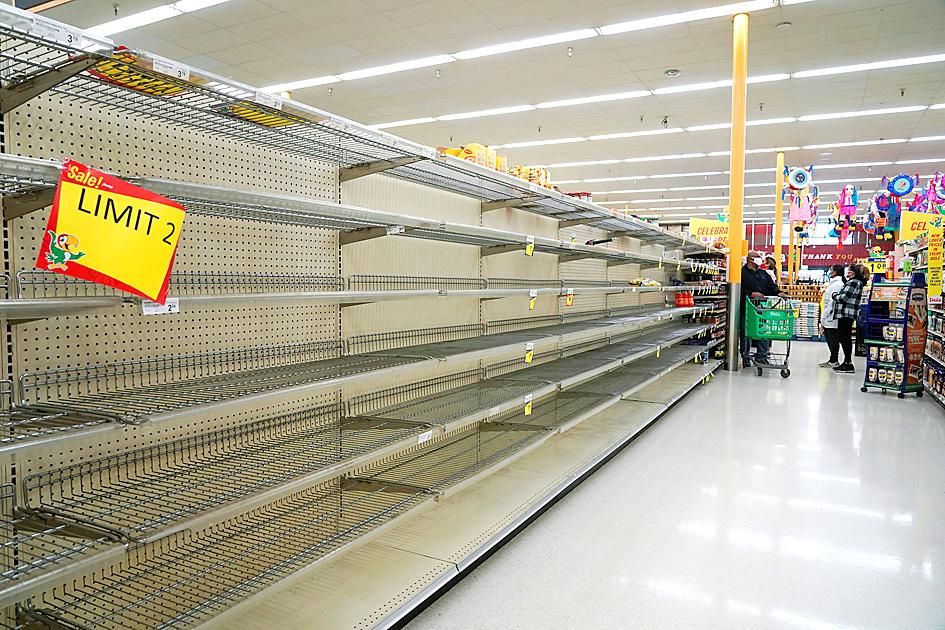Frustrated Texans lined up for hours on Friday for safe drinking water, after an unprecedented and deadly “polar plunge” burst pipes and left millions in the US state shivering without power or clean water for days.
The extreme winter weather system wreaked havoc across much of the southern and central US this week, reportedly killing at least 40 people and igniting anger in Texas as authorities scrambled to turn the lights back on.
Houston resident Percy McGee rated his frustration level at “No. 10” as he waited his turn at the city’s Delmar Stadium, now a mass bottled water distribution site.

Photo: Reuters
“I’ve been up since five o’clock, and I’ve been on the road since six, and I know it’s 11:30, but I’m gonna sit here until — I mean, I have no choice. All the stores in my area are out of water,” he said.
“I’m very frustrated. I’m a diabetic. I have a 94-year-old senior as a diabetic. We haven’t had no medicine. Nothing... So I’m really frustrated mentally, but I’m keeping it together,” he said.
Erica Granado, another Houston resident, said she had rushed to the site after seeing it on the news.
“I gotta be early because I knew everybody — yeah, everybody wants water, and so it’s a difficult time for everybody,” she said, adding: “Thank God I had gas in my car.”
On Friday the weather system was slowly moving northeast, where hardy New Englanders — far more used to scouring winter storms than residents of Texas — were battening down.
Even as the temperature rose above freezing in Texas — and the US National Weather Service forecast weekend weather of 10°C to 15°C — Texas Governor Greg Abbott said that 165,000 people were still without power.
Water pressure problems meant that nearly 7 million Texans were being advised to boil their water before drinking it or using for cooking, said Toby Baker, who heads the Texas Commission on Environmental Quality, adding that nearly 264,000 people were impacted by nonoperational water systems.
Some residents were facing the misery of burst pipes and flooding.
“It was like a waterfall was coming down and it was starting to come out of the bathroom and to the other rooms,” Birgit Kamps of Houston said, adding that a neighbor helped switch off the water at the break — halting the flood, but leaving her without running water.
Texas power companies implemented rolling blackouts over the past few days to avoid grids being overloaded as residents cranked up the heat during the cold snap.
The state is the only one in the continental US to have its own independent power grid, meaning it was cut off when the weather hit.
The blackouts also shut down a major computer chip manufacturer, NXP Semiconductors in Austin, at a time when a worsening shortage of semiconductors is already affecting a variety of sectors including automobiles, mobile phones, video game consoles and more.
Authorities opened hundreds of “warming centers” across the state. One furniture store in Houston also threw open its doors to freezing residents.
“We had a thousand people coming here trying our warming stations and getting free hot meals,” James McIngvale, owner of the Gallery Furniture store, said.
US President Joe Biden spoke with Bob Fenton, acting director of the Federal Emergency Management Agency, which is already on the ground in Texas, and said he was ready to mobilize other federal agencies, the White House said in a statement on Friday.
Biden also planned to sign a major disaster declaration in the state, the White House said.

ANGER: Unrest worsened after a taxi driver was killed by a police vehicle on Thursday, as protesters set alight government buildings across the nation Protests worsened overnight across major cities of Indonesia, far beyond the capital, Jakarta, as demonstrators defied Indonesian President Prabowo Subianto’s call for calm. The most serious unrest was seen in the eastern city of Makassar, while protests also unfolded in Bandung, Surabaya, Solo and Yogyakarta. By yesterday morning, crowds had dispersed in Jakarta. Troops patrolled the streets with tactical vehicles and helped civilians clear trash, although smoke was still rising in various protest sites. Three people died and five were injured in Makassar when protesters set fire to the regional parliament building during a plenary session on Friday evening, according to

Australia has announced an agreement with the tiny Pacific nation Nauru enabling it to send hundreds of immigrants to the barren island. The deal affects more than 220 immigrants in Australia, including some convicted of serious crimes. Australian Minister of Home Affairs Tony Burke signed the memorandum of understanding on a visit to Nauru, the government said in a statement on Friday. “It contains undertakings for the proper treatment and long-term residence of people who have no legal right to stay in Australia, to be received in Nauru,” it said. “Australia will provide funding to underpin this arrangement and support Nauru’s long-term economic

‘NEO-NAZIS’: A minister described the rally as ‘spreading hate’ and ‘dividing our communities,’ adding that it had been organized and promoted by far-right groups Thousands of Australians joined anti-immigration rallies across the country yesterday that the center-left government condemned, saying they sought to spread hate and were linked to neo-Nazis. “March for Australia” rallies against immigration were held in Sydney, and other state capitals and regional centers, according to the group’s Web site. “Mass migration has torn at the bonds that held our communities together,” the Web site said. The group posted on X on Saturday that the rallies aimed to do “what the mainstream politicians never have the courage to do: demand an end to mass immigration.” The group also said it was concerned about culture,

CRACKDOWN: The Indonesian president vowed to clamp down on ‘treason and terrorism,’ while acceding to some protest demands to revoke lawmaker benefits Protests in Indonesia over rising living costs and inequality intensified overnight, prompting Indonesian President Prabowo Subianto to cancel a planned trip to China, while demonstrators reportedly targeted the homes of the finance minister and several lawmakers. Rioters entered Indonesian Minister of Finance Sri Mulyani Indrawati’s residence near Jakarta early yesterday, but were repelled by armed forces personnel, Kompas reported. Items were taken from the homes of lawmaker Ahmad Sahroni and two others, according to Detik.com. The reports of looting could not be independently verified, and the finance ministry has not responded to requests for comment. The protests were sparked by outrage over